

Your essential ‘how-to’ guide to writing good abstracts. Article abstracts typically say little about what the researcher has discovered or what the key findings are, what they are arguing as a ‘bottom line’, or what key ‘take-away points’ they want readers to remember.
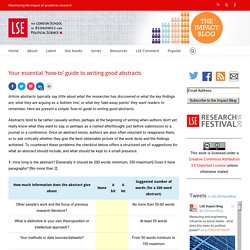
Here we present a simple ‘how-to’ guide to writing good abstracts. Abstracts tend to be rather casually written, perhaps at the beginning of writing when authors don’t yet really know what they want to say, or perhaps as a rushed afterthought just before submission to a journal or a conference. Once an abstract exists, authors are also often reluctant to reappraise them, or to ask critically whether they give the best obtainable picture of the work done and the findings achieved. To counteract these problems the checklist below offers a structured set of suggestions for what an abstract should include, and what should be kept to a small presence. 1. 2. 3. 4. 5. 6. 7. Elite journals are losing their position of privilege. Having first documented the large-scale demise of the impact factor as a predictor of quality research, George Lozano and team examined whether this pattern also applies to the handful of elite journals.
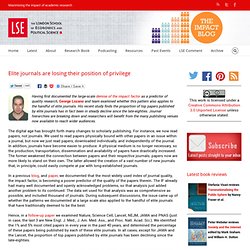
His recent study finds the proportion of top papers published by elite journals has in fact been in steady decline since the late-eighties. Journal hierarchies are breaking down and researchers will benefit from the many publishing venues now available to reach wider audiences. The digital age has brought forth many changes to scholarly publishing. For instance, we now read papers, not journals. Ademics: Ask not what Open Access can do for you, but what it can do for your disciplines. Arguments for and against Open Access tend to focus on the needs of individual academics.
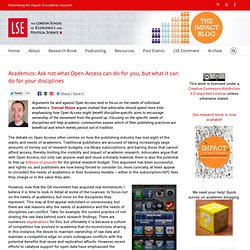
Samuel Moore argues instead that advocates should spend more time emphasising how Open Access might benefit discipline-specific aims to encourage ownership of the movement from the ground up. How can universities support local disadvantaged communities? Public engagement remains one of the most tangible ways universities can demonstrate their impact.

Fred Robinson finds that in a time of stretched resources, universities can play a much greater role in engaging with local disadvantaged communities, producing a wide-range of mutual benefits. Universities generally seem much more concerned about their international connections than their local relationships. For many universities, the local context seems not to matter much to either their jet-setting VCs or their lecturers and researchers under pressure to produce REFable outputs in obscure journals. Ok, that’s a bit of a parody, and doesn’t apply to all universities or all academics; but it’s how it often seems. In fact, it’s not as stark as that and there are many examples of universities engaging well with local communities.
8 steps to making your research punch above its weight. How can researchers ensure their work has a lasting impact?
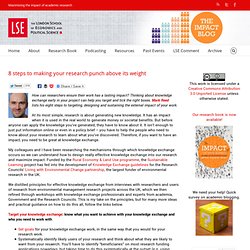
Thinking about knowledge exchange early in your project can help you target and tick the right boxes. Mark Reed lists his eight steps to targeting, designing and sustaining the external impact of your work. At its most simple, research is about generating new knowledge. It has an impact when it is used in the real world to generate money or societal benefits. But before anyone can apply the knowledge you’ve generated, they have to know about it. Reinventing journalism education by reinventing the university as journalism reinvents itself. Some journalism educators What contribution can higher education make to journalism?
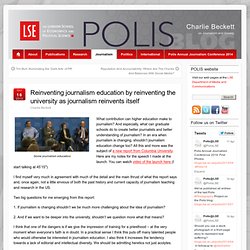
And especially, what can graduate schools do to create better journalists and better understanding of journalism? In an era when journalism is changing, shouldn’t journalism education change too? All this and more was the subject of a new report from Columbia University. Here are my notes for the speech I made at the launch. El periodismo y la universidad, un matrimonio perfecto. De reactivos, pasemos a proactivos.
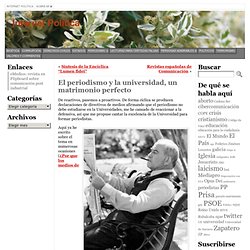
De forma cíclica se producen declaraciones de directivos de medios afirmando que el periodismo no debe estudiarse en la Universidades, me he cansado de reaccionar a la defensiva, así que me propuse cantar la excelencia de la Universidad para formar periodistas. Aquí ya he escrito sobre el tema en numerosas ocasiones (¿Por que los medios de comunicación desprecian la Universidad? , La carrera de periodismo, Carbonero, Francino y Barceló por ejemplo), pero ayer tuve una conversación con Juan Luis Manfredi, periodista y profesor de la Universidad de Castilla La Mancha, en Twitter y comentábamos el cansancio de estas polémicas, cuando la realidad es que las facultades de comunicación -originariamente de periodismo- tienen ya una trayectoria consolidada. 1.
Objeto de estudio. La burbuja universitaria. Muchos pueden celebrar por fin el cumplimiento de un antiguo deseo: la universidad ya no es una anacrónica rareza ni un cuerpo extraño infiltrado en el tejido social, sino lo que toda mente constructiva y acompasada con los tiempos ha querido desde siempre, a saber, un genuino reflejo de la sociedad.
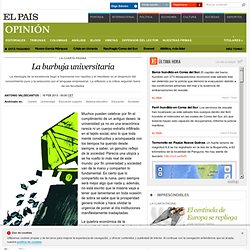
Parecía una utopía y se ha vuelto lo más real de este mundo: por fin universidad y sociedad van de la mano y comparten lo fundamental. Es cierto que lo compartido es la ruina, pero siempre será mejor algo que nada y, además, no está escrito que la miseria vaya a tener que lamentarse en toda ocasión: de sobra se sabe que la prosperidad genera molicie y hace olvidar la urgencia de poner al día instituciones manifiestamente inadaptadas. The Emergent Academic Proletariat and its Shortchanged Students. The Emergent Academic Proletariat and Its Shortchanged Students (Courtesy Shimer College Recondite Staff, via Wikimedia Commons) The phrase “corporatization of the university” captures the reorientation of colleges away from a primarily educational mission and toward one that resembles the financial bottom line.
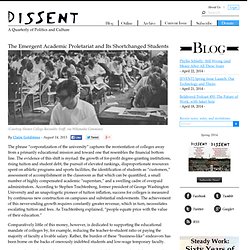
The evidence of this shift is myriad: the growth of for-profit degree-granting institutions, rising tuition and student debt, the pursuit of elevated rankings, disproportionate resources spent on athletic programs and sports facilities, the identification of students as “customers,” assessment of accomplishment in the classroom as that which can be quantified, a small number of highly compensated academic “superstars,” and a swelling cadre of overpaid administrators. Comparatively little of this money, however, is dedicated to supporting the educational mandate of colleges by, for example, reducing the teacher-to-student ratio or paying the majority of faculty a livable salary. Should you enter the academic blogosphere? A discussion on whether scholars should take the time to write a blog about their work.
While the blogosphere has always included sites by students, professors, librarians, administrators and other university members, more scholars are now tying their blogs to their work-related activities and making the connection between online presence and career development.
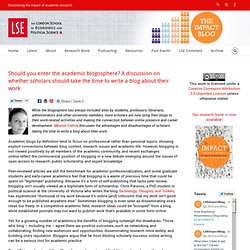
Melonie Fullick discusses the advantages and disadvantages of scholars taking the time to write a blog about their work. Academic blogs by definition tend to focus on professional rather than personal topics, showing explicit connections between blog content, research issues and academic life. However, blogging is not viewed positively by all members of the academic community, and recent exchanges online reflect the controversial position of blogging in a new debate emerging around the issues of open access to research, public scholarship and expert knowledge. Yet, for a growing number of academics the benefits of blogging outweigh the drawbacks. This article first appeared on University Affairs.